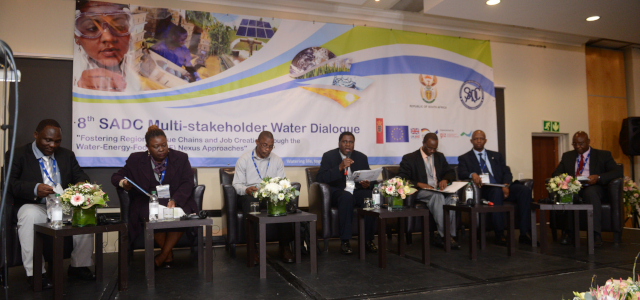The Dialogue has been held since 2007 under the broad theme of: Watering Development in SADC and has been premised on raising the awareness and understanding of how Integrated Water Resources Management (IWRM) approaches can contribute to 'socio-economic development and poverty eradication' by ensuring a water secure region. Stakeholders at the Dialogue provide solutions and recommendations aimed at ensuring that water continues to enable socio-economic development in the region. The outcomes from the Dialogue are taken forward into programmes and responses at different levels.
Through the subsidiarity principle, Global Water Partnership Southern Africa is an implementing agency of SADC tasked with facilitating the convening of the Dialogue since 2007. DANIDA has provided base funding for the Dialogues with support from other cooperating partners in the water sector through the framework of the Water Strategy Reference Group (WSRG). For the 2017 Dialogue additional funding was also provided by the European Union and the Deutsche Gesellschaft für Internationale Zusammenarbeit (GIZ) with delegated authority from Bundesministerium für wirtschaftliche Zusammenarbeit und Entwicklung (BMZ) (Federal Ministry for Economic Cooperation and Development), Germany, and Department for International Development (DFID), United Kingdom (UK).
Over the past ten years, the following Dialogues have been held:
- 1st Dialogue (2007) was held in Maputo, Mozambique - Watering Development in SADC: Beyond IWRM Concepts and the Converted
- 2nd Dialogue (2008) was held in Maseru, Lesotho under the theme Watering Development in SADC: Rising above the Climate Change Threat –Towards Security
- 3rd Dialogue (2009) was held in Johannesburg, South Arica and focused on groundwater. Its theme was Watering Development in SADC: Surfacing of the Hidden Resource – Groundwater
- 4th Dialogue (2010) was held in Maun, Botswana under the theme Watering Development in SADC: Toward Climate Resilience through Benefit sharing
- 5th Dialogue (2011) was held in Ezulwini, Swaziland - Watering development in SADC: Financing Water for Climate Resilience to Ensure Regional Security
- 6th Dialogue (2013) was held in Lusaka, Zambia - Watering development in SADC: Exploring the water, energy and food nexus for regional development
- 7th Dialogue (2015) was held in Windhoek, Namibia under the theme Watering Development in SADC: the central role of water in driving industrialization
Since 2013 the Dialogues have focused on the Nexus Approach resulting in the region taking forward the implementation of the approach with the water, energy and food sectors working together in SADC. From 2017 the European Union (EU) has been supporting the implementation of the SADC Nexus Dialogue Project which builds up from the 2013 Dialogue and is supporting the development of a nexus operational framework and identification of nexus investment projects. The 8th SADC Multi-stakeholder Dialogue thus provided a political platform for a Nexus Dialogue building on the momentum around embedding a nexus thinking into the regional discourse. The 2017 Dialogue was held under the theme "Fostering regional value chains and job creation through implmenting water-energy-food (WEF) nexus approaches".
SADC is pursuing a sustainable transformational pathway from factor-driven development to efficiency driven and ultimately innovation in its industrialization agenda. For this to be achieved the management and development of natural endowments and most importantly water, land and energy resources is critical. The nexus approach which SADC is promoting enhances synergies to simultaneously achieve water security, food security and energy security. It is also aimed at increasing natural resource use efficiencies whilst protecting the ecosystem.
The 2017 Dialogue focussed on the management and development of natural resources (water, land and energy resources) through a nexus approach in order to foster regional value chains and support in creating and sustaining jobs – through building synergies and integrated planning. Below Mr. Elijah Sichone Executive Secretary Regional Electricity Regulators Association of Southern Africa explains the importance of the nexus approach to the energy sector.
Conventional policy and decision-making is structured in 'silos' which makes it difficult to build synergies across sectors – a nexus approach allows for better interactions and synergies. A nexus approach will support better resource use efficiency and greater policy coherence. Ms. Modesta Kanjaye, Director Water Resources, Ministry of Agriculture, Irrigation and Water Development in Malawi speaks about the importance of Nexus in bringing government departments to work together.
The outcomes of the 2017 Dialogue are feeding into the development of the SADC Nexus Governance Framework and criteria of the investment framework being developed under the SADC Nexus Dialogue Project. The stakeholder inputs provided through the Dialogue are therefore critical in defining the Nexus approach and its implementation in the SADC region.
The Dialogue brought together more than 190 representatives from government departments and regional organizations working on water, energy, agriculture and economic planning. Other sectors represented included gender, environment, private sector, academia and international cooperating partners.
To see more pictures from the event, please click here.
To see more updates from the event, please click here.
